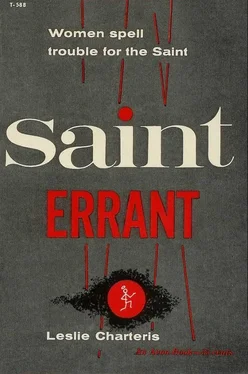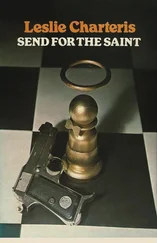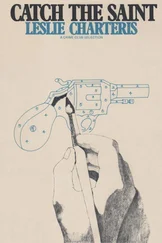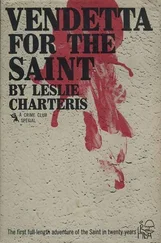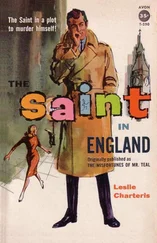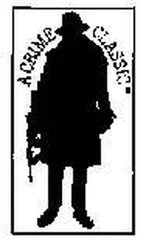Leslie Charteris - Saint Errant
Здесь есть возможность читать онлайн «Leslie Charteris - Saint Errant» весь текст электронной книги совершенно бесплатно (целиком полную версию без сокращений). В некоторых случаях можно слушать аудио, скачать через торрент в формате fb2 и присутствует краткое содержание. Год выпуска: 1954, ISBN: 1954, Издательство: Avon, Жанр: Крутой детектив, на английском языке. Описание произведения, (предисловие) а так же отзывы посетителей доступны на портале библиотеки ЛибКат.
- Название:Saint Errant
- Автор:
- Издательство:Avon
- Жанр:
- Год:1954
- ISBN:978-1477842874
- Рейтинг книги:3 / 5. Голосов: 1
-
Избранное:Добавить в избранное
- Отзывы:
-
Ваша оценка:
- 60
- 1
- 2
- 3
- 4
- 5
Saint Errant: краткое содержание, описание и аннотация
Предлагаем к чтению аннотацию, описание, краткое содержание или предисловие (зависит от того, что написал сам автор книги «Saint Errant»). Если вы не нашли необходимую информацию о книге — напишите в комментариях, мы постараемся отыскать её.
Saint Errant — читать онлайн бесплатно полную книгу (весь текст) целиком
Ниже представлен текст книги, разбитый по страницам. Система сохранения места последней прочитанной страницы, позволяет с удобством читать онлайн бесплатно книгу «Saint Errant», без необходимости каждый раз заново искать на чём Вы остановились. Поставьте закладку, и сможете в любой момент перейти на страницу, на которой закончили чтение.
Интервал:
Закладка:
“But do you know your way about here?”
“Montreal is yours,” said the Saint with a gesture. “What would you like? Respectable night clubs? Disreputable saloons? Historic monuments?”
She seemed to be thinking of something else. And then she turned towards him again in a pose very like his own. The deep friendly eyes had a queer wistfulness.
“Tell me, stranger — where do you think a girl should go on a great occasion? Suppose she had something rather desperate to do, and if it went wrong she mightn’t be able to choose where she went anymore.”
The Saint’s very clear blue eyes rested on her thoughtfully. He had always been mad, always hoped to be.
“I think,” he said, “I should take her out St Lawrence Boulevard to a quiet little restaurant I know where they make the best omelets in North America. We should absorb vitamins and talk about life. And after that we might know some more.”
“I should like to go there,” she said.
Simon flicked a twenty-dollar bill across his table and beckoned the waiter. The waiter counted out change laboriously from a well-filled wallet.
“Shall we?” said the Saint.
The girl gathered up her gloves and bag. Simon stood up quickly to pull the table away from in front of her. He trod heavily on the waiter’s toes, overbalanced him backwards, and caught him again dexterously as he was on the point of descending, like Newton’s apple, on the bald head of a customer in the next row. Somewhere in the course of the acrobatics the well-filled wallet traveled from the waiter’s pocket to the Saint’s own.
“ Mille pardons ,” murmured the Saint, patting the anguished man soothingly on the shoulder, and sauntered after the girl.
There was a taxi crawling by, and they climbed in.
“I’m free till twelve, stranger,” said the girl.
She pulled off her hat and leaned far back on the cushions, with one slim silken leg stretched out to rest a toe on the folding seat in front. The passing lights picked up her face in almost breathless perfection, and let it sink back reluctantly into shadow.
“And then do you have to hurry home before the clock strikes, and only leave a glass slipper for a souvenir?”
“No,” she said, “I have to burgle a house.”
There was an omelet. She had never dreamed of anything so delicate, wrapped in a gossamer skin, so richly red-gold inside, so different in every way from the dry coagulation of half-scrambled eggs which passes under the same name in so many places.
“There’s a trick in it,” she said with a sigh, when it was finished.
“Of course there is,” said the Saint. “It’s one of the higher mysteries of life, only to be revealed to the pure in heart after many ordeals and battles and much traveling.”
She accepted a cigarette from his case, dipped it in the flame of his lighter. Across the table the gray eyes looked into his with the serene intimacy which must come with the sharing of any sensuous pleasure, even eating. She said, “I’m glad I met you, stranger. You take things very calmly, and you don’t ask awkward questions.”
In the course of his career the Saint had taken a good many things calmly enough, but he could not remember having heard it accounted unto him for righteousness before.
He perceived that he had fallen into the error of attaching himself too much to the viewpoint of his bereaved victims.
“The questions may come later,” he said. “We burglars aren’t easily startled.”
She let a trail of smoke rise and disintegrate towards the ceiling.
“I’m going to talk to you, stranger,” she said quietly. “A girl likes to talk, and nothing about this evening is real. We never met before and we shan’t meet again. This is an interlude that doesn’t count, except for remembrance.”
“Is there a dragon in it?”
“There’s a Robber Baron. Have you ever heard of Burt Northwade?”
Simon had. His knowledge of unlovable characters, in and out of prison, was very nearly unique.
He knew Northwade for one of the more unpleasant products of World War I, a man who had successfully conceived the notion of selling inferior bootlaces to the Allied armies for three times their cost, and had gained for himself much wealth by that patriotic service. The Northwade business, subsequently built up to almost monopolistic proportions, was still welding together the uppers of half the world, but Northwade himself had retired a couple of years ago to his native Canada and a mansion in Westmount, leaving the female part of his family to pursue its strenuous climb through the social gradings of New York.
“Yes, I’ve heard of Northwade. One of these monuments of other people’s industry, isn’t he?”
“He’s also my uncle,” said the girl. “I’m Judith Northwade.” Simon Templar hadn’t blushed since he was eight years old. Also he considered that his remark was very nearly a compliment compared with what he would probably have said to Burt Northwade’s face, had that undesirable industrialist been present.
“You have our sympathy,” he said coolly.
“My father’s a professor of engineering at Toronto,” said the girl. “You’ve probably never heard of him. You couldn’t have two brothers who were more different. They’ve always been like that. Northwade only wanted to make money. My father never wanted it. He’s just a quiet, kind, completely ordinary man — almost a child outside his work. They both started at the bottom, and they both got what they wanted. Northwade made the money; my father worked his way through school, went on to Toronto University on a scholarship, and got to where he is now. The thing that came between them was my mother. Northwade wanted her, too, but she just happened to prefer Dad.” The Saint nodded.
“It wasn’t Dad’s fault,” she said, “but Uncle Burt never forgave him. I don’t think he was really jealous — maybe he wasn’t really in love at all — but he’d come on something that money and success alone couldn’t buy, and his vanity never got over it. Oh, he didn’t say anything outright; he’s always been friendly — too friendly — but Dad, who wouldn’t suspect a cannibal who was weighing him, never thought anything of it. I could see. I tried to tell him, but he wouldn’t believe me. He even helped Uncle Burt to make more money — he’s a clever inventor, too, and during the war he designed a machine that would put tags on laces twice as quickly as the old way, or something like that. I think Uncle Burt gave him fifty dollars for it.” She smiled a little. “It’s beginning to sound like a detective story, isn’t it?”
“It has begun,” said the Saint, “but I like those stories.”
She finished her glass of Château Olivier.
“It’s going to sound more like that, but it’s just one of those stories that are happening every day. For the last eighteen months or so Dad’s been working on an infinitely variable gear for automobiles. Do you know what that means? It means that you’ll just drive your car on the accelerator and brake, and whatever it’s doing, up hills or down, or in traffic or anywhere, without even an automatic gear change, the engine’ll always be working at its maximum efficiency — that sounds rather technical, but I’m so used to hearing Dad talk that I’ve got that way myself. Anyway, it’s far in advance of anything that’s been done in that line so far. There’s a fortune in it already, but it wasn’t good enough for Dad. He wanted to be sure that it was beyond any improvement. Three months ago he’d spent every penny he’d saved on his experiments. Then he went to Uncle Burt for help.”
The Saint’s mind moved in certain channels with the speed and precision of infinite experience. He took up his cigarette again and regarded her steadily over it.
Читать дальшеИнтервал:
Закладка:
Похожие книги на «Saint Errant»
Представляем Вашему вниманию похожие книги на «Saint Errant» списком для выбора. Мы отобрали схожую по названию и смыслу литературу в надежде предоставить читателям больше вариантов отыскать новые, интересные, ещё непрочитанные произведения.
Обсуждение, отзывы о книге «Saint Errant» и просто собственные мнения читателей. Оставьте ваши комментарии, напишите, что Вы думаете о произведении, его смысле или главных героях. Укажите что конкретно понравилось, а что нет, и почему Вы так считаете.
